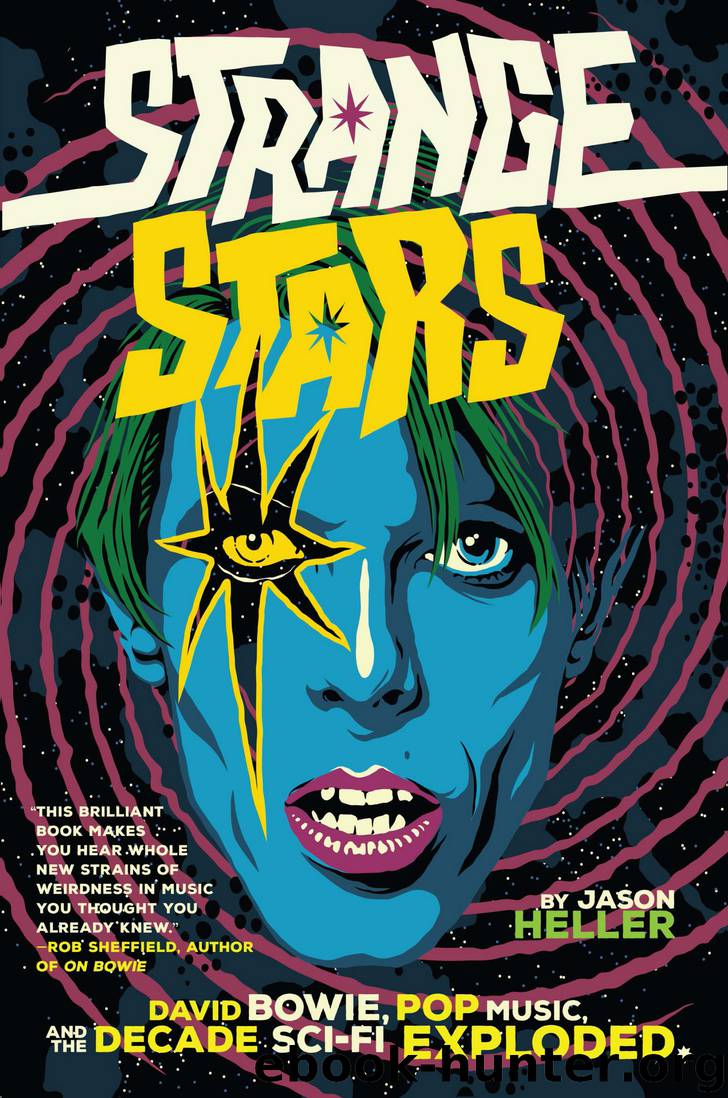Strange Stars by Jason Heller

Author:Jason Heller
Language: eng
Format: epub
Publisher: Melville House
Published: 2018-06-05T04:00:00+00:00
WHAT CAN THIS
STRANGE
DEVICE BE?: 1976
NEIL PEART, FAR FROM HIS TORONTO HOME, AMBLED OUT OF A PAWNSHOP in Arkansas with a bulky machine tucked under his arm. Climbing aboard the chartered bus that was parked outside the shop, he found his designated area among the seats and tables and made a space for his new acquisition.
The year was 1976, and the band Peart belonged to, Rush, was touring the United States. After eight years of unimpressive sales, they’d finally started to gain momentum with their latest album, 2112. Units were moving, and attendance at their shows was swelling. It was entirely possible, Peart surmised, that they were becoming rock stars. Introverted by nature, he preferred to keep to himself before and after their concerts, more likely to have his nose buried in a book than to be partying in a crowd. The debauchery that took place on tour buses in the ’70s is legendary—but on that day in Arkansas, Peart had something else in mind. He opened up the device he’d just purchased, placed it on a table, and caressed its keys. Then, as his bandmates Geddy Lee and Alex Lifeson piled onto the bus and settled in for the long drive to the next stop on the tour, Peart inserted a piece of paper into the apparatus and began typing.
“I carried [the typewriter] with me on tour and made an attempt at the inevitable first novel,” Peart remembered. The book was going to be “a science fiction story built around the songs from 2112.” Peart drummed for Rush, but he also wrote their lyrics—and his premise behind 2112 seemed to have tapped into something. Fans connected to the album in droves. At the start of 1976, their label, Mercury Records, was on the verge of dropping the Canadian hard-rock band. They warned the group that their upcoming fourth album needed to have hits; their immediately previous album, 1975’s Caress of Steel, saw progressive elements start to dominate over more radio-friendly material. Two tracks, “The Necromancer” and “The Fountain of Lamneth,” were lengthy songs dripping with fantasy. The former was heavily indebted to Tolkien, one of Peart’s favorite fantasy authors.
Mercury urged Rush to pump out shorter, more digestible chunks of Led Zeppelin–like rock, as they’d done when they started out as a party band in the suburbs of Toronto. Peart did indeed take the band in a new direction in 1976—but not the one Mercury wanted. For their next album, 2112, he shed the elves and wizards of the fantasy genre. Instead, he struck out into science fiction. The first side of the album comprises a story line set, unsurprisingly, in the year 2112—in the same way Orwell’s Nineteen Eighty-Four is set in that year. And, like Orwell’s novel, Peart’s twenty-minute seven-part masterpiece concerns a totalitarian regime that controls all aspects of life and suppresses the freedom and individuality of its citizens. Rather than taking place on a mostly recognizable version of Earth, though, 2112 takes place in a postwar union of planets—one might even call it an empire—ruled by the Red Star of the Solar Federation.
Download
This site does not store any files on its server. We only index and link to content provided by other sites. Please contact the content providers to delete copyright contents if any and email us, we'll remove relevant links or contents immediately.
Sapiens: A Brief History of Humankind by Yuval Noah Harari(14376)
Sapiens by Yuval Noah Harari(5367)
Pale Blue Dot by Carl Sagan(5002)
Homo Deus: A Brief History of Tomorrow by Yuval Noah Harari(4911)
Livewired by David Eagleman(3767)
Origin Story: A Big History of Everything by David Christian(3691)
Brief Answers to the Big Questions by Stephen Hawking(3430)
Inferior by Angela Saini(3311)
Origin Story by David Christian(3198)
Signature in the Cell: DNA and the Evidence for Intelligent Design by Stephen C. Meyer(3133)
The Gene: An Intimate History by Siddhartha Mukherjee(3095)
The Evolution of Beauty by Richard O. Prum(2994)
Aliens by Jim Al-Khalili(2828)
How The Mind Works by Steven Pinker(2814)
A Short History of Nearly Everything by Bryson Bill(2691)
Sex at Dawn: The Prehistoric Origins of Modern Sexuality by Ryan Christopher(2528)
From Bacteria to Bach and Back by Daniel C. Dennett(2483)
Endless Forms Most Beautiful by Sean B. Carroll(2479)
Who We Are and How We Got Here by David Reich(2436)
